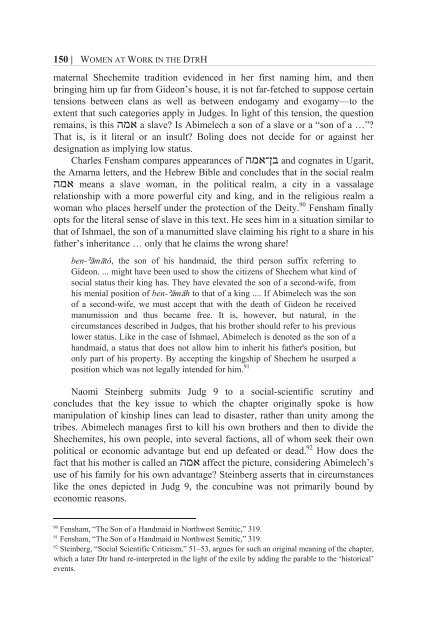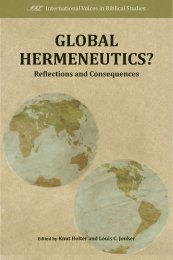Women at Work in the Deuteronomistic History - International Voices ...
Women at Work in the Deuteronomistic History - International Voices ...
Women at Work in the Deuteronomistic History - International Voices ...
Create successful ePaper yourself
Turn your PDF publications into a flip-book with our unique Google optimized e-Paper software.
150 | WOMEN AT WORK IN THE DTRH<br />
m<strong>at</strong>ernal Shechemite tradition evidenced <strong>in</strong> her first nam<strong>in</strong>g him, and <strong>the</strong>n<br />
br<strong>in</strong>g<strong>in</strong>g him up far from Gideon’s house, it is not far-fetched to suppose certa<strong>in</strong><br />
tensions between clans as well as between endogamy and exogamy—to <strong>the</strong><br />
extent th<strong>at</strong> such c<strong>at</strong>egories apply <strong>in</strong> Judges. In light of this tension, <strong>the</strong> question<br />
rema<strong>in</strong>s, is this המא a slave? Is Abimelech a son of a slave or a “son of a …”?<br />
Th<strong>at</strong> is, is it literal or an <strong>in</strong>sult? Bol<strong>in</strong>g does not decide for or aga<strong>in</strong>st her<br />
design<strong>at</strong>ion as imply<strong>in</strong>g low st<strong>at</strong>us.<br />
Charles Fensham compares appearances of המא־ןב and cogn<strong>at</strong>es <strong>in</strong> Ugarit,<br />
<strong>the</strong> Amarna letters, and <strong>the</strong> Hebrew Bible and concludes th<strong>at</strong> <strong>in</strong> <strong>the</strong> social realm<br />
המא means a slave woman, <strong>in</strong> <strong>the</strong> political realm, a city <strong>in</strong> a vassalage<br />
rel<strong>at</strong>ionship with a more powerful city and k<strong>in</strong>g, and <strong>in</strong> <strong>the</strong> religious realm a<br />
woman who places herself under <strong>the</strong> protection of <strong>the</strong> Deity. 90 Fensham f<strong>in</strong>ally<br />
opts for <strong>the</strong> literal sense of slave <strong>in</strong> this text. He sees him <strong>in</strong> a situ<strong>at</strong>ion similar to<br />
th<strong>at</strong> of Ishmael, <strong>the</strong> son of a manumitted slave claim<strong>in</strong>g his right to a share <strong>in</strong> his<br />
f<strong>at</strong>her’s <strong>in</strong>heritance … only th<strong>at</strong> he claims <strong>the</strong> wrong share!<br />
ben-´ámätô, <strong>the</strong> son of his handmaid, <strong>the</strong> third person suffix referr<strong>in</strong>g to<br />
Gideon. ... might have been used to show <strong>the</strong> citizens of Shechem wh<strong>at</strong> k<strong>in</strong>d of<br />
social st<strong>at</strong>us <strong>the</strong>ir k<strong>in</strong>g has. They have elev<strong>at</strong>ed <strong>the</strong> son of a second-wife, from<br />
his menial position of ben-´ämäh to th<strong>at</strong> of a k<strong>in</strong>g .... If Abimelech was <strong>the</strong> son<br />
of a second-wife, we must accept th<strong>at</strong> with <strong>the</strong> de<strong>at</strong>h of Gideon he received<br />
manumission and thus became free. It is, however, but n<strong>at</strong>ural, <strong>in</strong> <strong>the</strong><br />
circumstances described <strong>in</strong> Judges, th<strong>at</strong> his bro<strong>the</strong>r should refer to his previous<br />
lower st<strong>at</strong>us. Like <strong>in</strong> <strong>the</strong> case of Ishmael, Abimelech is denoted as <strong>the</strong> son of a<br />
handmaid, a st<strong>at</strong>us th<strong>at</strong> does not allow him to <strong>in</strong>herit his f<strong>at</strong>her's position, but<br />
only part of his property. By accept<strong>in</strong>g <strong>the</strong> k<strong>in</strong>gship of Shechem he usurped a<br />
position which was not legally <strong>in</strong>tended for him. 91<br />
Naomi Ste<strong>in</strong>berg submits Judg 9 to a social-scientific scrut<strong>in</strong>y and<br />
concludes th<strong>at</strong> <strong>the</strong> key issue to which <strong>the</strong> chapter orig<strong>in</strong>ally spoke is how<br />
manipul<strong>at</strong>ion of k<strong>in</strong>ship l<strong>in</strong>es can lead to disaster, r<strong>at</strong>her than unity among <strong>the</strong><br />
tribes. Abimelech manages first to kill his own bro<strong>the</strong>rs and <strong>the</strong>n to divide <strong>the</strong><br />
Shechemites, his own people, <strong>in</strong>to several factions, all of whom seek <strong>the</strong>ir own<br />
political or economic advantage but end up defe<strong>at</strong>ed or dead. 92 How does <strong>the</strong><br />
fact th<strong>at</strong> his mo<strong>the</strong>r is called an המא affect <strong>the</strong> picture, consider<strong>in</strong>g Abimelech’s<br />
use of his family for his own advantage? Ste<strong>in</strong>berg asserts th<strong>at</strong> <strong>in</strong> circumstances<br />
like <strong>the</strong> ones depicted <strong>in</strong> Judg 9, <strong>the</strong> concub<strong>in</strong>e was not primarily bound by<br />
economic reasons.<br />
90 Fensham, “The Son of a Handmaid <strong>in</strong> Northwest Semitic,” 319.<br />
91 Fensham, “The Son of a Handmaid <strong>in</strong> Northwest Semitic,” 319.<br />
92 Ste<strong>in</strong>berg, “Social Scientific Criticism,” 51–53, argues for such an orig<strong>in</strong>al mean<strong>in</strong>g of <strong>the</strong> chapter,<br />
which a l<strong>at</strong>er Dtr hand re-<strong>in</strong>terpreted <strong>in</strong> <strong>the</strong> light of <strong>the</strong> exile by add<strong>in</strong>g <strong>the</strong> parable to <strong>the</strong> ‘historical’<br />
events.




